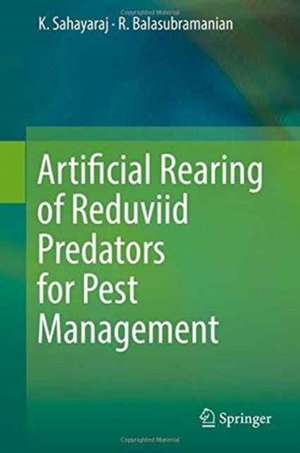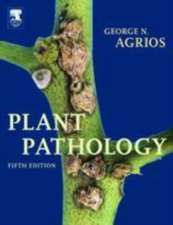Artificial Rearing of Reduviid Predators for Pest Management
Autor K. Sahayaraj, R. Balasubramanianen Limba Engleză Hardback – 28 dec 2016
This book commences with a review of the diversity of reduviid predators in agro-ecosystems world-wide, followed by chapters on their feeding behavior, biology, gut microbiota, their enzyme profile, body protein and genomics, and DNA and field evaluation reports. The field evaluation of reduviids, a worldwide undertaking, is addressed in the last chapter.
Each chapter includes a separate conclusion and future recommendations. Detailed information is also included on ingredients and artificial diet preparation, storage and the impact on predators. The artificial rearing of reduviid predator for crop pest management is an essential reference and teaching tool for teachers, researchers and extension workers in developed and developing countries alike, allowing them to produce reduviid predators and important natural enemies in biocontrol and bio-intensive integrated pest management programs.
The book offers an excellent resource for all those who are working on beneficial arthropod mass production. It is also an essential reference guide for agricultural and biological sciences scientists, entomologists, crop protection specialists, extension workers, and consultants.
| Toate formatele și edițiile | Preț | Express |
|---|---|---|
| Paperback (1) | 551.06 lei 38-44 zile | |
| Springer Nature Singapore – 14 iul 2018 | 551.06 lei 38-44 zile | |
| Hardback (1) | 568.43 lei 38-44 zile | |
| Springer Nature Singapore – 28 dec 2016 | 568.43 lei 38-44 zile |
Preț: 568.43 lei
Preț vechi: 710.54 lei
-20% Nou
Puncte Express: 853
Preț estimativ în valută:
108.78€ • 112.38$ • 90.53£
108.78€ • 112.38$ • 90.53£
Carte tipărită la comandă
Livrare economică 21-27 martie
Preluare comenzi: 021 569.72.76
Specificații
ISBN-13: 9789811025211
ISBN-10: 9811025215
Pagini: 170
Ilustrații: XVI, 180 p. 26 illus., 13 illus. in color.
Dimensiuni: 155 x 235 x 18 mm
Greutate: 0.54 kg
Ediția:1st ed. 2016
Editura: Springer Nature Singapore
Colecția Springer
Locul publicării:Singapore, Singapore
ISBN-10: 9811025215
Pagini: 170
Ilustrații: XVI, 180 p. 26 illus., 13 illus. in color.
Dimensiuni: 155 x 235 x 18 mm
Greutate: 0.54 kg
Ediția:1st ed. 2016
Editura: Springer Nature Singapore
Colecția Springer
Locul publicării:Singapore, Singapore
Cuprins
Chapter 1. Reduviid: An Important Biological Control Agent.- Chapter 2. Feeding Behaviour Against Meridic Artificial Diet.- Chapter 3. Biology.- Chapter 4. Gut-Autochthonous Microbes and Their Enzyme Profile.- Chapter 5. Gut Enzyme Profile.- Chapter 6. Body Total Protein and Genomic DNA.- Chapter 7. Field Evaluation.
Notă biografică
Dr. K. Sahayaraj is an Associate Professor of Department of Zoology and Director of the Crop Protection Research Centre, St. Xavier’s College, Palaymkottai affiliated to Manonmaniam Sundaranar University, Tirunelveli. He is a recognized Fellow of six national societies/academic bodies. Dr. Sahayaraj has published six books and one proceeding on Ecofriendly Insect Pest Management. He has more than 200 publications to his credit, including original research papers, book chapters, and popular articles in insect ecology, behavior, biology and physiology, as well as numerous papers on the biological control efficacy of reduviids, botanicals, fungal pathogens and bionanoparticles. He has been honored with several awards from regional (Best Researcher in Science, St. Xavier’s College), national (Scientists of the Year–2008, NESA, New Delhi; Young Achievers Award-2010 by SADHNA, Solan; Bharat Seva Ratan Gold Medal Award-2014 by GEPRA, New Delhi; Bharat Seven Rethan Gold Medel by GEPBRA, New Delhi) and international agencies (Hyoshi Environmentalist Award, Japan; YOUNG IOBC travel grant awardee).
He has guided more than 19 Ph.D. scholars and supervised two researchers. He has consistently worked to transfer laboratory findings to neighborhood farmers and to offer them guidance on BIPM. To this end, he has brought out five manuals/books in Tamil. Most recently, he has been engaged in publishing an international journal, the Journal of Biopesticides.
Dr. R. Balasubramanian received his Bachelor’s and postgraduate degrees in Zoology from Madurai Kamaraj University, India in 2000 and 2003 respectively. His research career began in year 2004 at Fisheries College and Research Institute, Thoothukudi, Tamilnadu, as a technical assistant, where he carried out research in shrimp culture with different diets. In 2005, Dr. Balasubramanian went on to pursue his Ph.D. at St. Xavier’s College, Palayamkottai (Manonmaniam Sundaranar University) on the synthesis of artificial diet for mass production of hemipteran predators. Here, he learned about agricultural entomology, especially biological control, the bioecology of insects, advanced technologies in modern biological science, and the artificial rearing of predator insects. He has published a number of research papers on biocontrol, bioecology of insects and oligidic diet preparation for reduviid mass production. In March 2009, Dr. Balasubramanian joined the Department of Medical Entomology and Zoology, National Institute of Virology, Pune, where he began conducting research on Medical Entomology. More recently he has served as a scientist at the National Institute in Kerala field unit, Alappuzha, Kerala.
He has guided more than 19 Ph.D. scholars and supervised two researchers. He has consistently worked to transfer laboratory findings to neighborhood farmers and to offer them guidance on BIPM. To this end, he has brought out five manuals/books in Tamil. Most recently, he has been engaged in publishing an international journal, the Journal of Biopesticides.
Dr. R. Balasubramanian received his Bachelor’s and postgraduate degrees in Zoology from Madurai Kamaraj University, India in 2000 and 2003 respectively. His research career began in year 2004 at Fisheries College and Research Institute, Thoothukudi, Tamilnadu, as a technical assistant, where he carried out research in shrimp culture with different diets. In 2005, Dr. Balasubramanian went on to pursue his Ph.D. at St. Xavier’s College, Palayamkottai (Manonmaniam Sundaranar University) on the synthesis of artificial diet for mass production of hemipteran predators. Here, he learned about agricultural entomology, especially biological control, the bioecology of insects, advanced technologies in modern biological science, and the artificial rearing of predator insects. He has published a number of research papers on biocontrol, bioecology of insects and oligidic diet preparation for reduviid mass production. In March 2009, Dr. Balasubramanian joined the Department of Medical Entomology and Zoology, National Institute of Virology, Pune, where he began conducting research on Medical Entomology. More recently he has served as a scientist at the National Institute in Kerala field unit, Alappuzha, Kerala.
Textul de pe ultima copertă
This eye-opening book focuses on the development of techniques to mass-produce reduviid predators and important generalist predators, an endeavor that won’t prove sufficient if the cost of commercialization is prohibitive. Advancing mass production to the level of economic feasibility is critical, so that these new technologies can compete in the open market.
This book commences with a review of the diversity of reduviid predators in agro-ecosystems world-wide, followed by chapters on their feeding behavior, biology, gut microbiota, their enzyme profile, body protein and genomics, and DNA and field evaluation reports. The field evaluation of reduviids, a worldwide undertaking, is addressed in the last chapter.
Each chapter includes a separate conclusion and future recommendations. Detailed information is also included on ingredients and artificial diet preparation, storage and the impact on predators. The artificial rearing of reduviid predator for crop pest management is an essential reference and teaching tool for teachers, researchers and extension workers in developed and developing countries alike, allowing them to produce reduviid predators and important natural enemies in biocontrol and bio-intensive integrated pest management programs. The book offers an excellent resource for all those who are working on beneficial arthropod mass production. It is also an essential reference guide for agricultural and biological sciences scientists, entomologists, crop protection specialists, extension workers, and consultants.
This book commences with a review of the diversity of reduviid predators in agro-ecosystems world-wide, followed by chapters on their feeding behavior, biology, gut microbiota, their enzyme profile, body protein and genomics, and DNA and field evaluation reports. The field evaluation of reduviids, a worldwide undertaking, is addressed in the last chapter.
Each chapter includes a separate conclusion and future recommendations. Detailed information is also included on ingredients and artificial diet preparation, storage and the impact on predators. The artificial rearing of reduviid predator for crop pest management is an essential reference and teaching tool for teachers, researchers and extension workers in developed and developing countries alike, allowing them to produce reduviid predators and important natural enemies in biocontrol and bio-intensive integrated pest management programs. The book offers an excellent resource for all those who are working on beneficial arthropod mass production. It is also an essential reference guide for agricultural and biological sciences scientists, entomologists, crop protection specialists, extension workers, and consultants.
Caracteristici
Includes distribution of reduviids in agro-ecosystems worldwide Focuses on new techniques for the mass production of reduviid predators Addresses the increasing global demand for alternatives to chemical pesticides for biological control producers Provides concrete solutions that allow agrochemical companies to use any indigenous reduviid predator as a biocontrol agent Explores the possible utilization of meat-based artificial diets in the rearing of reduviid predators


